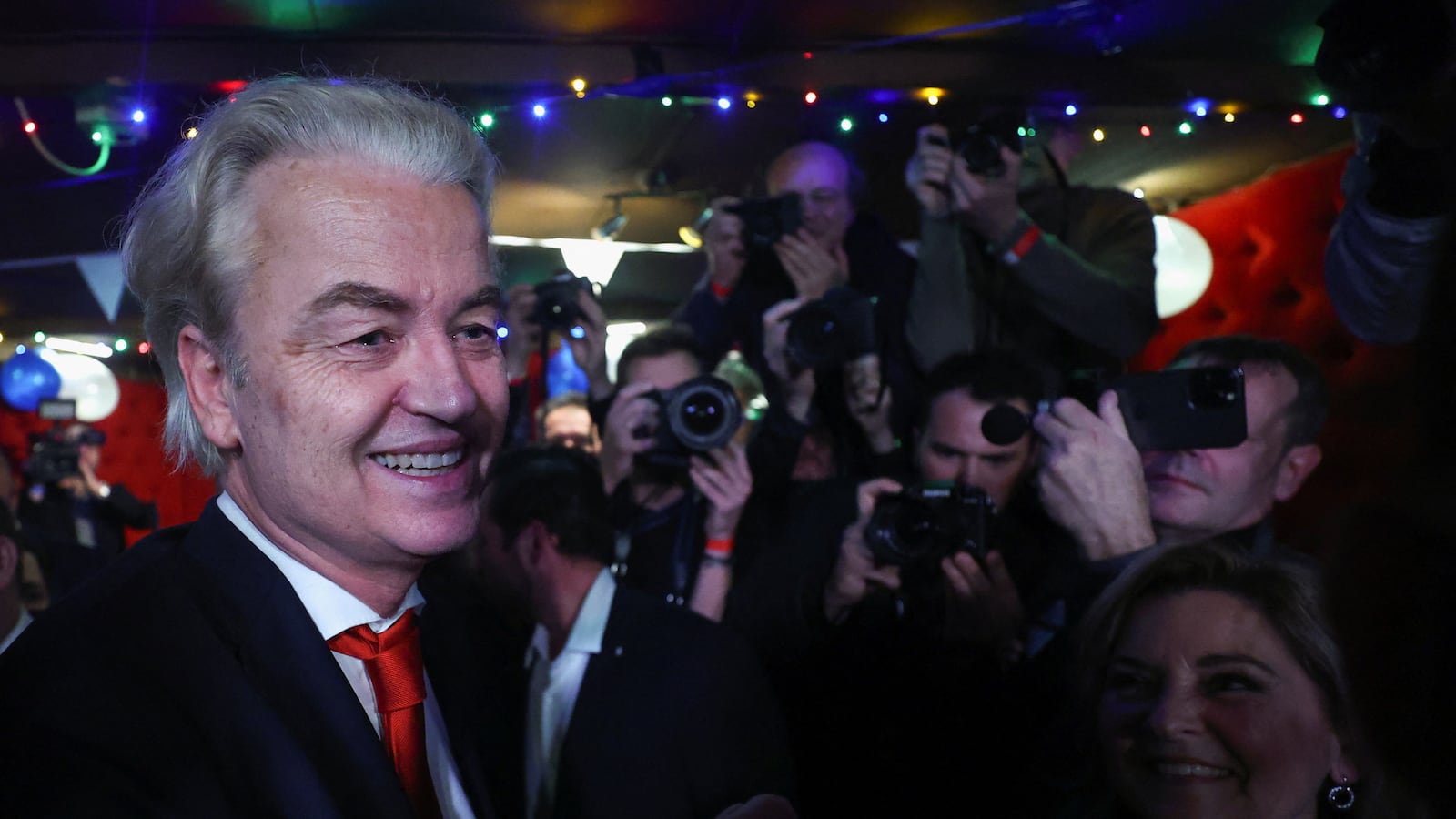HOORN, Netherlands—Geert Wilders and his populist, far-right, and anti-Islam party have won parliamentary elections in the Netherlands, according to shock exit polls published Wednesday night.
The exit poll could have a margin of error of up to three seats, says pollster Ipsos, but Wilders’ Party for Freedom (PVV) looks on course to more than double its showing to around 35 seats in the 150 seat Dutch House of Representatives making it by far the largest party. Under the Dutch system, the parties will have to negotiate a coalition government, but they were the undisputed winners on the night.
Wilders—who has a conviction for inciting discrimination—has been known for his extreme anti-Islamic and anti-migrant sentiment. He wants to shut mosques, ban the Quran and slash immigration. In the past, he has described Islam as a pro-terror “fascist ideology.” He called Moroccans “scum” and proposed the introduction of a levy on wearing headscarves, which he labeled the “head rag tax.”
He has made a number of high-profile appearances in the U.S.—including the campaign to stop a mosque being built near the scene of 9/11—where he has been celebrated by the likes of Pamela Geller and Richard Spencer. In 2009, he was banned from entering Britain because his opinions “threaten community harmony and therefore public safety.”
On Wednesday night, utter disbelief could be seen on the faces of supporters of the other parties who came together to watch the results. While politicians lined up to decry the “nasty” and “worrying” results, Green-Labour leader and veteran diplomat Frans Timmermans felt the need to reassure citizens of all backgrounds who have “got questions about if they belong” in the Netherlands that they are still welcome “no matter where your cradle stood.”
Muhsin Köktas, who represents a Dutch Islamic organization, told The Daily Beast that he has fears for the fate of Muslims under Wilders. “For Muslims, this will be a difficult period. The PVV offers no future prospects for Muslims. According to their program, they want to forbid Islamic schools and fight Islam. They do not specify what they mean by that. It worries me.”
Nourdin el Ouali, from another Islamic community organization, told The Daily Beast: “The government's total distrust of the Muslim community has been a fact for a long time. The fact that Wilders has now become the largest party is just a symbol of this. Until tonight, he was the uncrowned king of Islamophobia. Tonight, he received his crown.”
Shocking Result
Four years ago, the national and international media took the prospect of a Wilders win seriously but until this weekend, that seemed out of the question this time around. Four days before election day, however, the PVV found itself shooting up in the polls again. A bandwagon effect followed, and the party kept rising. Still, the exit poll was a lot higher than pollsters expected.
According to analysts, the center-right VVD cleared the way for Wilders to win this campaign. The Islamophobe had been excluded from mainstream politics for years by other parties, but the new VVD leader opened the doors to his campaign apparently persuading people that it was acceptable to vote for the PVV again.
Wilders also mollified his controversial opinions during this campaign. The anti-Islam views are still in their program, but have “less priority,” he said last week. In a final television debate on Tuesday, he promised to be a Prime Minister ‘for all Dutchmen,’ if it comes to that. Köktas is skeptical about that statement. “He does not see us as the Dutch he means,” he said.
On a turbulent election night, liberal leader Dilan Yesilgöz denied that his party had opened the door for Wilders. “Not us, but the voters have made the PVV the biggest party,” she said on Dutch television. She argued that the win was a result of legitimate concerns of the public. “If you do not solve these issues, this victory is the outcome,” she said.
Prime Minister Wilders?
In his first reaction to the results, Wilders said that his party is ready to participate in the Dutch government. Denying them would be “undemocratic” and the voter “would not accept that,” he believes. Still, trying to set up a cabinet with Wilders is complicated. A role for Wilders as Prime Minister even more so. The liberal VVD has already said that they won’t be part of a coalition with Wilders as Prime Minister. However, leader Yesilgöz points to Wilders to take the initiative for coalition negations.
Green-Labour leader Timmermans, the second party after Wilders, repeated tonight that they won’t be part of a coalition with Wilders in it at all. Pieter Omtzigt, another winner today, has said similar things before. Wilders can’t govern on his own and needs to find a majority in parliament. The Netherlands has a history of long coalition negotiations. Last time, the negotiations took more than a year—which was a record—and that didn’t include one of the world’s most controversial politicians.
While the negotiations go on, Wilders will continue to cast a shadow over global race-relations.






